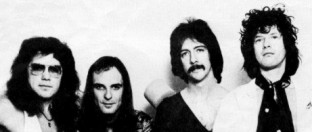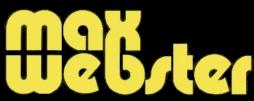Max Goes To Europe
By Roman Mitz
In a small, homey flat in Cabbagetown, there resides one Kim Mitchell, lead guitarist and vocalist for the country's most unique rock band, Max Webster. Onstage, Mitchell wears outlandish costumes, sometimes topped with lovely cooking aprons and colourful rain hats. When he begins to hurtle his six foot two inch frame around the stage, the effect is not dissimilar to that of peering through a key-hole at some sort of side show. The guitarist's weird image complements the group's music rather nicely. Over the course of four albums, Max Webster has taken us from among the cats to beyond the moon without lingering for a moment.
I was a little apprehensive about interviewing a man who, in his songs, "freaked out on electric meat" and talked about "cocaine-coloured computer cards." Much to my surprise, the house interior looked rather conservative and Mitchell was not to be found hanging from one of the light fixtures. Instead, he and lyricist Pye Dubois (the unseen fifth member of the band) were most hospitable and brimming with excitement about their recently completed European tour with Rush.
Only a handful of Canadian bands ever becomes successful enough to tour the U.S., much less Europe. Even fewer encounter the immediate success of Max Webster. "The general comment in the dressing rooms afterward was that this just doesn't happen to a supporting act," explains Mitchell. "People don't stand up at the end of the show screaming for an encore. As the support band, you can't fool around or they'll boo you right off the stage."
Max' reputation grew with their stage show, but it was their European label that initially made the public stand up and take notice. "You've got to picture the first night we were there," Kim recalls. "The record company loaded stacks of money into the band. They had picture discs, maxi discs and ads, and they just pumped us like they haven't pumped a band before. At the concerts they gave away a sampler record which really went over well. The kids over there hold on to stuff like that; they like gifts."
Since the band was born and bred in the bars, the smaller-sized European halls suited them perfectly. A few of the gigs were extra special to Kim. "We played The Marquee, where people like The Who got their start, and there were four nights at The Hammersmith Odeon in London. That's a prestigious gig to play. There was an opera house in Hamburg that was so old that I'm sure all these dudes like Bach and Liszt had to have been there at one time."
It wasn't that impressive now, but you could just tell by the decor and sculpture that there were once political speakers there," adds Dubois, whose sharp eyes didn't miss a thing in compiling a rather extensive log of the group's tour.
Another event of note was the band's appearance on The Top Of The Pops, Britain's infamous Rock 'n' Roll television show. "It's a pretty weird show," laughs Pye. "I got to see it back in London and it was really psychedelic. Kim would be playing a guitar and all of a sudden he would blossom into orange and green or his guitar neck would stretch out."
"And then there's these little disco queens standing in front of us dancing away," Kim cuts in. "They would just get out there and shake their heads and go out of their minds whether they've been doing anything or not. They're high and they're gone and they're just pouring in sweat. It was just great."
Because the BBC demanded a master tape of the song to be used on the show, Max had to re-record Paradise Skies using a British studio. "We went into Abbey Road Studios in the middle of the night," says Kim. "It's pretty old and dumpy, actually, and ancient by today's technical standards. We used Studio Two, where The Beatles did all of their stuff. The old board in there looked like an airplane console, but when we started playing the drum kit immediately sounded like The Beatles."
On the evening they played Top Of The Pops, Max Webster was billed with the likes of Abba, Judas Priest and The Undertones. The mention of this last band sparks an animated conversation about the British music scene. "Britain is just a singles market," says Mitchell. "Most of the bands would not survive in Toronto bars alone because they have nothing to offer... they were really dull. After their hit dies, I'm sure most of them just fall by the wayside. They couldn't hold their ass in a concert - not at all."
Kim readily admits that Max' appearance on Top Of The Pops and the entire successful European tour wouldn't have been possible without the help of Rush. "They've opened up Canada for us, they've opened up the States for us and now they've opened up Europe. They've been great guys to us. We've opened up for a lot of bands and it's never been as good as when we open up for Rush - only because we know what to expect. It's Rush's show so there's a certain amount of lights, time and stage space. It was a case of take the encore if you want it and take the second encore if there's time."
I wondered if the royal welcome Max received onstage continued during their leisure hours. "No," replies Kim bluntly. "They're funny people. In England there were cases where Americans would take a plate of food and throw it in a guy's face because it was so bad, the service so terrible and it was so expensive. American people don't put up with it and that bums the English people out. As an example, one night we ordered sandwiches into a room and you could see through this terrible Pastrami and there was no butter or anything."
"Germany was better," Pye adds. "They've got a sense of decency. After a while, though, we learned what to order; There's a couple of things they can't screw up. It's hard when you go to a country that doesn't have grilled cheese."
What the group missed out on in good food they more than made up for in breathtaking sights. "Yeah," says Pye. "When we played Denmark and Sweden we were just knocked out. You're confronted by bodies and facial features which are just amazing. Beautiful skin, big blue eyes, blonde hair, they just look... healthy."
It should be interesting to see if the sights and sounds of Europe affect the group's writing for the next LP. The ever-changing Max is currently hunting for a producer, and names like Cars/Queen producer Roy Thomas Baker are being bandied about. The producer of their first three albums, Terry Brown, was replaced on A Million Vacations by John de Nottbeck.
"It didn't go right with Terry on the last one," Kim explains. "He's good, he's excellent in what he pulls out, but it just didn't feel comfortable with him. All John de Nottbeck did was make sure things were feeling good, whereas I felt a little too pressured by Terry Brown."
Regardless of who ends up producing the next disc, the Websters are sure to be strong contenders for Canadian Juno awards for many years to come. Although they didn't win big this year, Kim Mitchell livened up the evening with his introduction of Dan Hill's nominated hit. "I caused a lot of grief when I said 'Sometimes When We Brunch,' but Dan Hill is always scowling. He scowled the year he won everything. When he came backstage, he put his arm around me and said, 'That was a great line. Where did you get that?' He wasn't bummed out, and if he can't take some comic relief, too bad. You've got to have some fun once in a while; the whole show was too straight."
'Good fun' and 'straight' are key words in describing Max Webster. Although they have developed an image as a very strange band with quite a bizarre following, they remain level-headed in a sea of weirdness. "It's very difficult leading this kind of lifestyle," says Kim. "It's too nuts, and getting crazier every day. To abuse yourself and do drugs and drink a lot - that kind of thing makes it really difficult to get up every morning and to get through every day."
This strong attitude towards self-preservation, combined with the optimistic European response, should make Max Webster international stars in the near future. One promoter already is talking about a return to England, as early as this fall, to headline a tour. "It was great over there," Kim enthuses. "That's our element. We've got to follow it up because they poured a lot of money into us and we didn't let them down. We blew them away. I don't know why, but it just kept growing and growing as the tour went on. Next time we'll break it; we've got our claws in it already."

